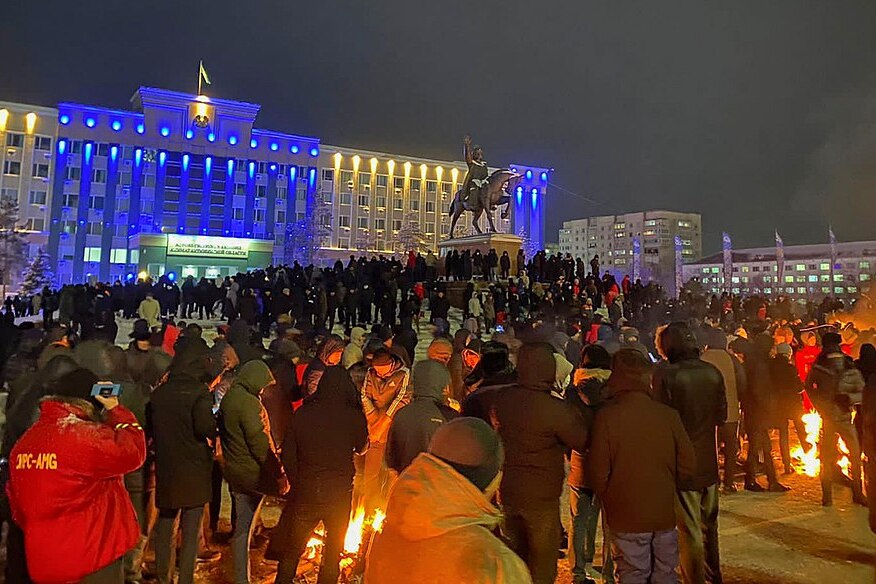While all eyes were on a possible Russian invasion of Ukraine, Moscow deployed its troops to Kazakhstan, allegedly to help stabilize the situation in the country faced with mass violent protests. For the Kremlin, the energy-rich Central Asian nation seems to have a priority over Russia’s Eastern European neighbor.
Nominally, Kazakhstan is Russia’s ally in the Collective Security Treaty Organization (CSTO), but over the years Nur-Sultan developed close military ties with the United States. Kazakhstan and the US regularly hold their annual Steppe Eagle military exercises, and until recently America reportedly had several military biological laboratories in the former Soviet republic. More importantly, Chevron – an American multinational energy corporation – is Kazakhstan’s largest private oil producer, holding important stakes in two of the nation’s biggest oil-producing fields – Tengiz and Karachaganak. Although Russia’s energy giants, such as Lukoil, Zarubezhneft and Rosneft, are also active in the Central Asian country, reports suggest that Western and Chinese corporations operating in Kazakhstan play a far bigger role in Kazakh oil extraction than Russian companies.
Could it be that Russia-led CSTO troops are in Kazakhstan to do a “dirty job” on behalf of its Western and Chinese partners? According to Kazakh President Kassym-Jomart Tokayev, CSTO forces will remain in the country “until the situation is completely stabilized”. But who destabilized Kazakhstan in the first place?
“Of course, we understand the events in Kazakhstan are not the first and far from the last attempt to interfere in the internal affairs of CSTO states from the outside”, said Russian President Vladimir Putin, not specifying who attempted to interfere in the Kazakh affairs.
Throughout the summer and autumn of 2021, workers all over Kazakhstan staged labor strikes. Even the protests that erupted in the first days of January 2022 had a strong working-class character. What started as protests over the government’s decision to increase gas prices soon turned into a nightmare. At least 164 people, including both protesters and members of Kazakhstan’s security apparatus, have been killed and thousands have been injured. Economic damage from the riots may amount to $2-3 billion. The authorities blame foreign-backed terrorists for the violent arrests.
Protesters in Almaty stormed government buildings and police did not even try to prevent them. In some places, police and the army even joined the protesters
“The analysis of the situation showed that Kazakhstan is facing an armed act of aggression, well prepared and coordinated by perpetrators and terrorist groups trained outside the country”, wrote Tokayev on Twitter on January 7, a day after he appealed to CSTO for assistance.
Unlike in 2011, when police and riot troops fired on unarmed protesters in the city of Zhanaozen killing 16 people, in 2022 security forces behaved with ambivalence. Protesters in Almaty – Kazakhstan’s largest metropolis – as well as in other cities and towns mostly in the southwest of the country, stormed government buildings and police did not even try to prevent them. In some places, police and the army even joined the protesters.
The authorities claim that a conspiracy of internal and external forces is behind the destabilization of the situation in Kazakhstan. There is speculation that certain forces within a political clan of the former Kazakh President Nursultan Nazarbayev attempted to force a regime change in Kazakhstan. It is worth remembering that Nazarbayev – who has not spoken publicly since the protests started – had very close ties with former British Prime Ministers Margaret Thatcher and Tony Blair. On the other hand, former chairman of Bank Turan Alem (BTA Bank), Mukhtar Ablyazov, has published his headquarters’ WhatsApp numbers, with Ukrainian prefixes, calling on people to connect and coordinate their actions. Also, the former head of Kazakhstan’s National Security Committee, Karim Massimov, dismissed by Tokayev on 5 January, has been detained on suspicion of treason, while a former Nazarbayev’s advisor Yermukhamet Yertysbayev said that “traitors in law enforcement” are responsible for the chaos in Kazakhstan.
Whoever is behind the turmoil in the former Soviet republic, the people of Kazakhstan are now playing the role of an instrument used by various foreign and domestic actors. It will take months, if not years before the country recovers from the consequences of the unrest. Meanwhile, Russia is expected to increase its influence in Kazakhstan. Even if Russian troops soon withdraw from the country, Tokayev will likely have to “return the favor” to Putin, who helped him stay in power. The Kremlin is already using the same strategy in Belarus, whose leader Alexander Lukashenko, known for his “multivector foreign policy”, is now heavily dependent on Moscow after Russia helped him defeat Western-backed mass protests in 2020.
Unlike Lukashenko, who is now playing exclusively the Russian card, Tokayev will likely continue to balance between the interests of various foreign powers in Kazakhstan, although that balance will be more in Russia’s favor. After all, the very fact the United States and other Western powers have not imposed sanctions on Tokayev and Russia, or at least attempted to prevent the deployment of CSTO troops to Kazakhstan, suggests that Moscow got tacit approval by its Western partners to intervene in the Central Asian nation.
Image credit: Esetok

